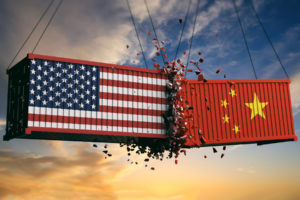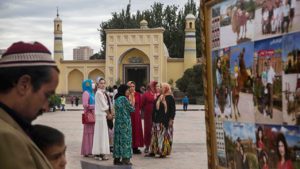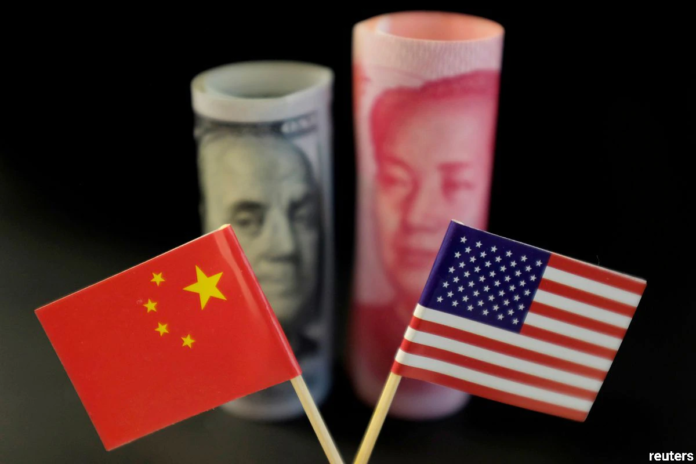CAIRO (special correspondent):Islamic Research Foundation Cairo organised a Webinar last week, on the topic of the US-China Trade and Media war, especially its new Xinjiang-related bill. Scholars from Al-Azhar University Egypt, Nanjing University China and RMIT University, Australia participated in Webinar.
Scholars from Al-Azhar University shed light on the history of Muslims in China. It was discussed in the webinar that Muslims are not new in China, in history we find, signs of Islam in the early ages of this religion. Uyghur Muslims are one of the key topics to discuss in the webinar because they got a lot of space in Western Media, before this very few even know their existence. In 2018, the UN Committee on the Elimination of Racial Discrimination claimed that more than one million people were being held in a network of detention centres across Xinjiang. After this, we saw a massive campaign on International media about Uyghur Muslims. However, China has kept denying all these reports.
The portrayal of China in Western media is also part of the Scholars’ debate. A scholar from RMIT University pointed out that in 2000, Bush junior said in his first presidential speech that China is a real threat and enemy of the US. That speech gave a new target and enemy to Western media. However, since 2016, we observed the campaign against China got new momentum.
One of the key topics of the Webinar was the US-China Trade war. Scholars underline that US and China both are the world’s largest economies. According to the US census bureau in 2021, the bilateral trade between these countries equalled $654 billion (which was 683 in 2018), of which $154 billion and $504 billion were US exports and imports, respectively. However, we have seen massive conflicts between both countries in the last few years. In January 2018, U.S. President Donald Trump began setting tariffs and other trade barriers on China to force it to make changes to what the U.S. says are unfair trade practices and intellectual property theft. The US has imposed tariffs on more than $360bn of Chinese goods, and China has retaliated with tariffs on more than $110bn of US products.

A Nanjing University Scholar highlighted that anti-China forces in the US and the West merely pretend to care about human rights but were using the Uyghur issue as a means to “destabilize Xinjiang and suppress China”. In which they will not succeed. This is also the fact that Xinjiang Uygur autonomous region gained rapid growth in the last few years. Chines largest road network project OBOR starts from there. The dramatically significant development of the pluralistic and diverse region of China’s Xinjiang Uygur autonomous region has dismissed the propaganda peddled by Western elements, who have never visited this land.
Background
Since 2017, the United States has been accusing Chinese authorities that they have committed crimes against humanity against Uyghurs and other Turkic Muslims in the northwest Xinjiang region, detaining as many as one million people and subjecting detainees and others to forced labour inside and outside Xinjiang. However, the Chinese government keep denying this fact, and they call it the US planned accusation against them. In the last five years, we have seen a massive media campaign against China by Western media. Several scholars believe that the fastest-growing economy of China is a threat to US hegemony in the world. China will be a new superpower in near future, which is indigestible for Uncle Sam.
In the last few years, the US and it’s few Allies are in a trade war against China, they have enforced many sanctions to halt China’s industrial progress but they couldn’t. It’s an old technique to demonise and malign your enemy as much as you can through media and other tools. During the last five years, we have seen a unified voice and campaign in Western media in which the Chinese government is targeted for human rights violations of Uyghurs and other Turkic Muslims. The Chinese government claimed that whatever comes in Western media against them is all accusations to demonise and no facts in it.
Last year, the US House of Representatives overwhelmingly approved forced labour legislation that would ban the importation of goods sourced in China’s Xinjiang Uygur autonomous region. After the signature of the US president, The Uyghur Forces Labor Prevention Act (UFLPA), into effect on June 21, 2022, gives US authorities increased powers to block the import of goods linked to forced labour in China. The bill, called the Uygur Forced Labour Prevention Act, creates a “rebuttable presumption” that all goods partially or wholly produced in Xinjiang are tainted by forced labour, and therefore ineligible for import. Companies would have the option to appeal if they can produce “clear and convincing evidence” that their supply chains are free of forced labour. The new law creates a presumption that goods made in whole or in part in Xinjiang, or produced by entities in China linked to forced labour, are not eligible to be imported into the United States. The bill also expands existing asset- and visa-blocking sanctions related to Xinjiang to cover foreign individuals and entities responsible for serious human rights abuses in connection with forced labour.
The Chinese government has harshly criticized the UFLPA and has urged the U.S. not to implement it. A spokesperson for China’s Foreign Ministry said, “If implemented, the Act will seriously disrupt normal cooperation between Chinese and American businesses, undermine the stability of global supply chains, and eventually hurt the U.S.’s interests. We urge the U.S. to refrain from enforcing the Act, stop using Xinjiang-related issues to interfere in China’s internal affairs and contain China’s development. If the U.S. is bent on doing so, China will take forceful measures to firmly defend its interests and dignity.” The Chinese government did not specify what measures it would be prepared to take in response. It has a number of countermeasures it could employ, such as 2021 Countering Foreign Sanctions Law but has so far refrained from applying these measures to non-Chinese companies for their compliance with non-Chinese laws, although some companies that have made public statements about compliance activities have encountered backlash in China.

China believes that the US has been using its influence on international forums like the UN, Human Rights, think tanks and Western Media to pressurise its country. In August 2022, the United Nations human rights office released a long-delayed and damning report on conditions for the Uyghurs in China’s north-western Xinjiang autonomous region. The report details serious rights abuse against Uyghurs and other ethnic minorities in Xinjiang and states that such treatment by China may amount to “crimes against humanity”.
The UN report says that serious violations have been committed in Xinjiang under China’s application of measures to counter “terrorism” and “extremism”. However, China has described the UN report as a “farce”. Defending its policies towards the Uyghurs, China’s Permanent Mission to the UN in Geneva attached a 131-page response document. The Chinese and UN report on Xinjiang and the treatment of Uyghurs are opposed in their views of the situation.
Beijing has enforced severe security measures in Xinjiang in recent years in what it says are efforts to combat separatism and religious extremism. As part of those operations, Beijing has been accused of confining more than one million Uyghurs and other Muslim minorities in a network of detention facilities across Xinjiang. According to the UN report, China’s anti-terrorism laws have led to the arbitrary detention – on a wide scale – of Uyghurs and other mainly Muslim communities through so-called “Vocational Education and Training Centres” (VETC) – facilities where individuals are sent for “de-radicalization” and “re-education”.
The UN said there were credible allegations of torture, ill-treatment, and poor conditions in the VETCs and other facilities, as well as forced medical treatments and incidents of sexual and gender-based violence. However, Chine deny all these accusations and called its fabricated stories against them.






